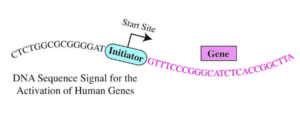
The latest breakthrough in pharmacogenomic news comes from biologists at UC San Diego. They have cracked the code that initiates transcription and regulates the activity of more than half of all human genes, an achievement that should provide scientists with a better understanding of how human genes are turned on and off.
The biologists at UC San Diego have named this code, the “human initiator.” The detailed report is published in the February 10th issue of the journal Genes & Development.
Why is the Human Initiator Important?
The discovery will allow scientists to learn exactly what makes genes start and stop. This is the latest great advancement in the field of pharmacogenomics.
“There are many sequence signals that control gene activity in human cells and the Initiator is the most commonly occurring sequence at the start sites of genes,” says James T. Kadonaga, a molecular biology professor at UC San Diego who headed the team of researchers. “The solution of the human Initiator code will enable us to explore new frontiers in gene regulation. In the future, it will be possible to use the code to identify other regulatory signals and, in this way, gain a more complete understanding of how human genes are turned on and off.”
Every human cell contains about six feet of DNA. DNA is made up of the nucleotides adenosine (A), cytosine (C), guanine (G) and tyrosine (T). The sequencing is what tells the cells which proteins to produce.
“In these six feet of DNA, there are tens of thousands of genes, which are segments of DNA that direct specific functions, such as the production of a hormone or an enzyme,” explains Kadonaga. “It is essential for the cell to control the activity of each of its tens of thousands of genes, because the improper control of gene activity can lead to adverse outcomes such as cell death or the formation of a cancer cell.”
Why is This Important to Pharmacogenomic News?
Understanding what turns genes on and off can be useful to some pharmacogenomic processes. This could lead to further breakthroughs in genetic testing. Affording scientists the ability to understand how to turn genes on and off. This breakthrough in pharmacogenomic news will mean better testing and possible cures for diseases, as well as the ability to prescribe medicines with a greater degree of certainty. This pharmacogenomic news is of particular importance in the treatment of cancer.
“It is essential for the cell to control the activity of each of its tens of thousands of genes, because the improper control of gene activity can lead to adverse outcomes such as cell death or the formation of a cancer cell.”
For all the latest pharmacogenomic news check back regularly and subscribe to our free newsletter.